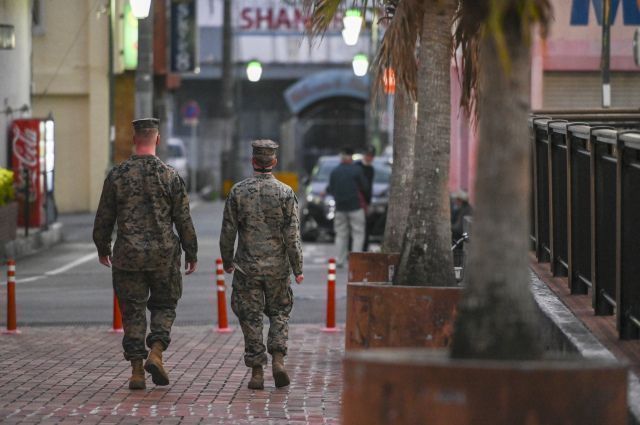The streets of U.S. bases become ghost towns as restrictions on leaving residences begin, food and drink establishments hope for a “quick resolution”

U.S. soldiers walking around Shinkaichi, the commercial district neighboring Camp Hansen – January 10 just after 6:00 p.m. in Kin (Photograph by Moriaki Kise)
January 11, 2022 Ryukyu Shimpo
By Ryota ShimabukuroBy Ryota Shimabukuro [Central/Northern Okinawa] – Facing the spread of COVID-19 amongst U.S. service men and women stationed in Japan, restrictions against U.S. military personnel leaving their residence except for necessities began January 10, and they have all but disappeared from the streets of the town surrounding the bases. Combined with it being a weekday for the U.S. military, the streets in front of the bases gates were quieter than usual.
The new cluster of coronavirus cases began at the end of last year at Camp Hansen in Kin. On January 10, the base’s surrounding commercial district Shinkaichi had almost no soldiers walking the streets, but soldiers in camouflage could be seen training inside the fences surrounding the base.
On the night of January 7, the bars were bustling with activity and a group of around 20 soldiers could be seen walking through the streets, but on the 10th this scene had disappeared. One man who runs a restaurant in the area said with concern, “I have both doses of the vaccine, so I do feel somewhat safe, but I am a bit concerned about running a restaurant, where people will need to go without masks. Business will definitely drop due to the lockdown.” Another man who runs a restaurant commented, “There is nothing really that can be done at this time. I just hope that the coronavirus situation settles down quickly.”
One .U.S marine who described himself as an officer walking around Shinkaichi on January 7 gave a short explanation, saying he was “encouraging marines to follow the curfew.” On January 10, the were also some marines making similar rounds.
On January 8, a large number of U.S. military personnel could be seen shopping in Mihama, Chatan. However on January 10 only a few local families and couples could be seen. Fukuko Santos (in her 40’s) who works at a Thai restaurant, said “Usually we see some US military members even on weekdays at lunch time, but today there was almost nobody. With the coronavirus reducing the number of tourists as well, it has really had an effect on foot traffic. I hope the situation resolves itself quickly. (compiled by Ryota Shimabukuro)
(English translation by T&CT and Sam Grieb)
Previous Article:Hatoyama says strengthening of SDF presence in Nansei Islands is based on “antiquated ideas”
Next Article:Hospital staffing shortages lead to reduced COVID-19 capacity and limited emergency services
[Similar Articles]
- Proportion of coronavirus cases on U.S. bases in Okinawa exceeds proportions in Europe and U.S.
- Soldiers pour into main streets after period of mourning for US forces on Okinawa
- Consumer confidence among U.S. military personnel falls due to the strong yen
- Walking tour of Koza resumes after three-year hiatus, including the taco stand featured in the movie “Miracle City Koza”
- 23 servicemen desert from U.S.military bases in Japan: one still at large among four deserters from bases in Okinawa
 Webcam(Kokusai Street)
Webcam(Kokusai Street)


